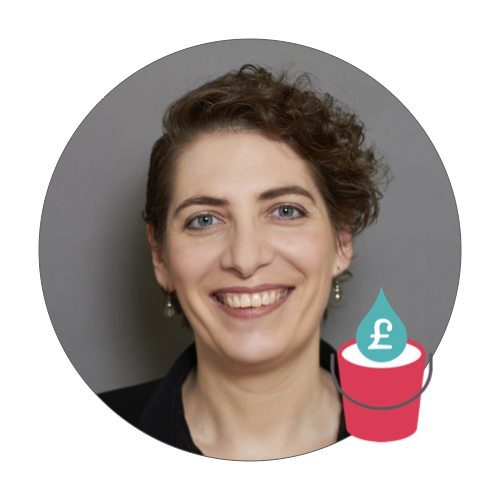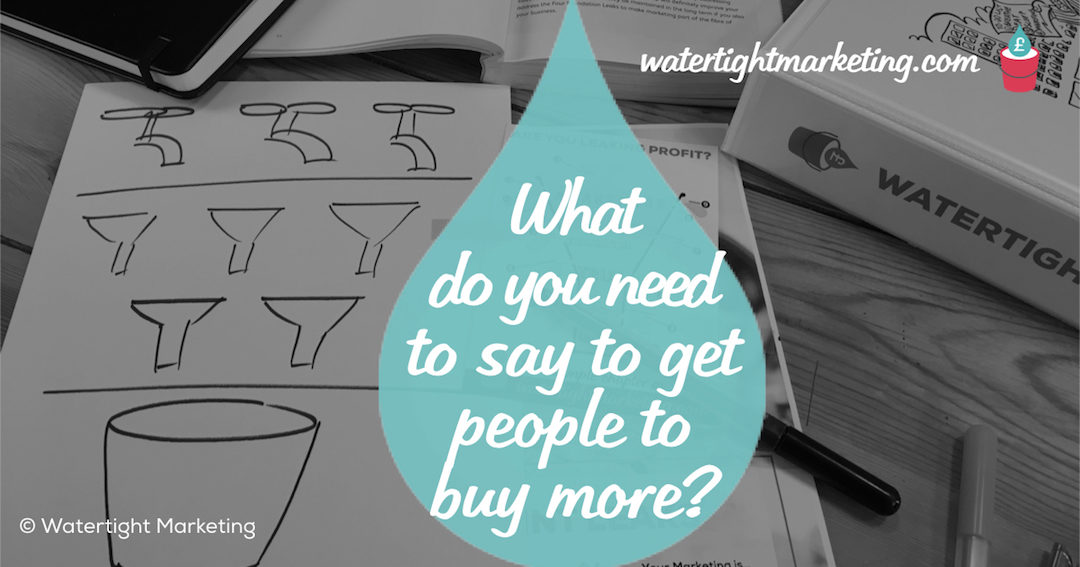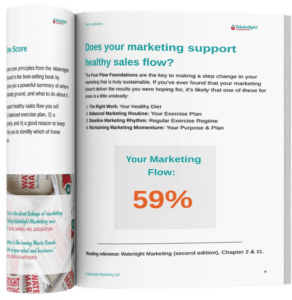My mantra is that the job of marketing is to lay down the stepping stones that mean that your sales people can invite people forward in a respectful and fully committed way. But, how should a salesperson do this? I’ve asked Nicola Cook to share a few key pointers in this guest post to answer exactly that question. ~ Bryony Thomas
Help us sell more. Tell us what we need to say to our prospective customers to make them want to buy”.
That was the request from one of the organisations with which I’ve just completed a skills & strategy improvement programme. The thing is. It’s unanswerable. You’ll never know what to say unless you ask great questions.
Less telling, more asking
Like many companies that approach me, they are specialists in what they do, in this case a Biotech company. With brains like Einstein, ask them to tell you about their products, their industry, or their technical knowledge and they can give you facts, figures and statistics galore; (and this group really did have brains like Einstein, every single one of them holds a PhD!) but what they thought they lacked was the ‘sales patter’, the language of sales, and the ability to relate what they do to what their customers may need.
Too often their prospective customers would end a conversation by asking for information to be sent through, or leaving them to think about it. Sound familiar?
The interesting thing is, believing the answer to increasing sales is to develop a slicker ‘sales patter’ is a major misconception of selling. Many people assume that salespeople are ‘born’ not ‘made’ and that to be good in sales, you need to have some sort of silver tongue. In fact, nothing could be further from the truth.
Yes it’s true that some likeability factor is important in any service-based role. In sales it helps if you like people and you can make people easily warm to you but even these rapport building skills can be learned and honed, however the key skill in holding a sales conversation is not the ability to ‘tell and sell’, but the ability to ‘ask and listen’.
Use a structured framework to ask questions
I spend way more time with my clients teaching them asking intelligent and detailed questions within a structured framework, than helping them design any slick sales speak.
Asking the right questions will help you engage your client in the first instance and allow you to lead them into a controlled conversation.
By following a structured qualification technique you can negate almost all objections that could emerge later on. Obviously, you uncover what your client really needs and therefore what you need to base your sales solution on. Finally you increase the momentum in the sale by increasing the client’s emotional attachment to you and your product – and this is before you’ve even revealed your proposed solution!
Questions help you judge the client’s commitment to the sale and evaluate their buying signals. By using specific questions in the form of ‘Tie-Downs’ and ‘Yes Momentums’ you can increase the momentum to a final close. Questions in the form of ‘Test Closes’ will ensure you only move the client towards a commitment when they are in the emotional state to commit to the purchase.
Asking intelligent questions, that really make your client think, particularly at the earlier stages of the conversation, will set you apart from others in your profession. Ask the same old, same old questions that everyone else asks, and your client will pigeonhole you along with those other dumb asses!
Avoid closed questions
Ironically the one area of the sales conversation I discourage questions, particularly closed questions, is the one area that most people assume is the time they should be using them…and that’s when closing the sale! Anyone caught asking, “So would you like me to go ahead with that?” will earn a clip round his or her earhole from me!
Questions like this poor example destroy the hard work you’ve done earlier and could allow the client to wriggle away from you, even if they really do want to proceed with your suggestions. Whereas, if you’ve asked all of the right questions earlier on, you should be in a position to either assume the sale at this stage, or use much more sophisticated methods to cement the client’s commitment.
Something for you to think about – what are the 25 or so questions that you could use with your prospects, that other people in your sector or industry are simply not asking
 by Nicola Cook. An award winning entrepreneur and twice published international best-selling author on professional selling and personal & business growth. She is CEO of Company Shortcuts, an innovative sales acceleration agency delivering models for profitable growth. companyshortcuts.com | @NicolaCook
by Nicola Cook. An award winning entrepreneur and twice published international best-selling author on professional selling and personal & business growth. She is CEO of Company Shortcuts, an innovative sales acceleration agency delivering models for profitable growth. companyshortcuts.com | @NicolaCook
——————————————

Bryony Thomas
Author & Founder, Watertight Marketing
Bryony Thomas is the creator of the multi-award winning Watertight Marketing methodology, captured in her best-selling book of the same name. She is one of the UK's foremost marketing thinkers, featured by the likes of Forbes, The Guardian, Business Insider and many more, and in-demand speaker for business conferences, in-house sales days and high-level Board strategy days.


